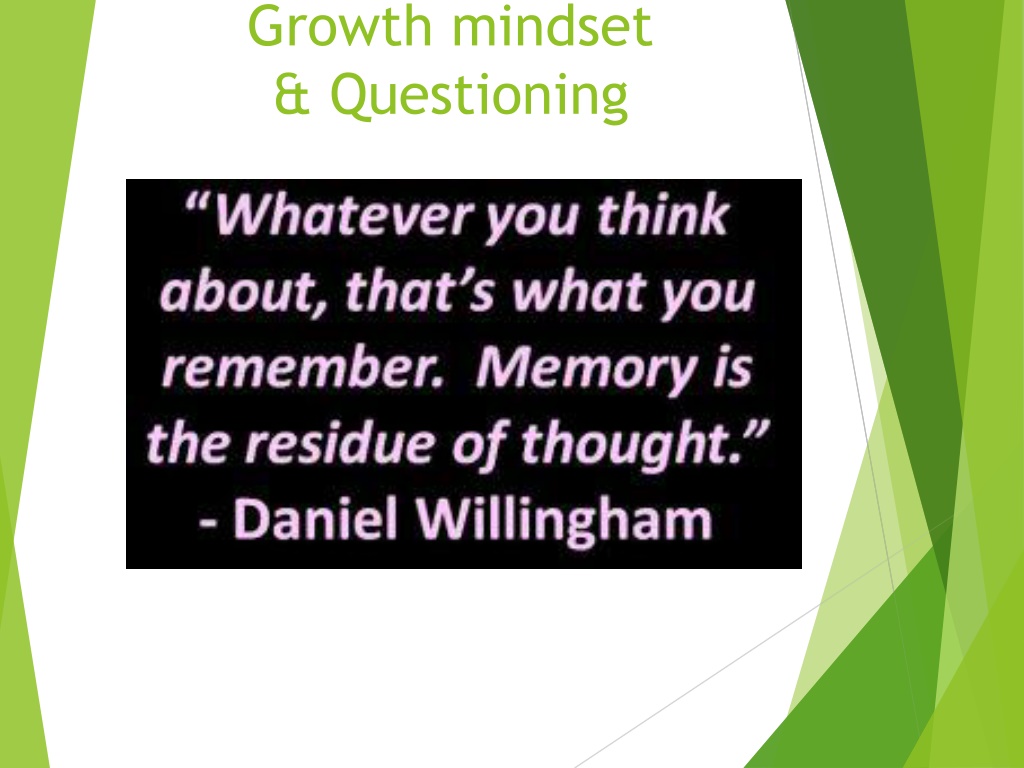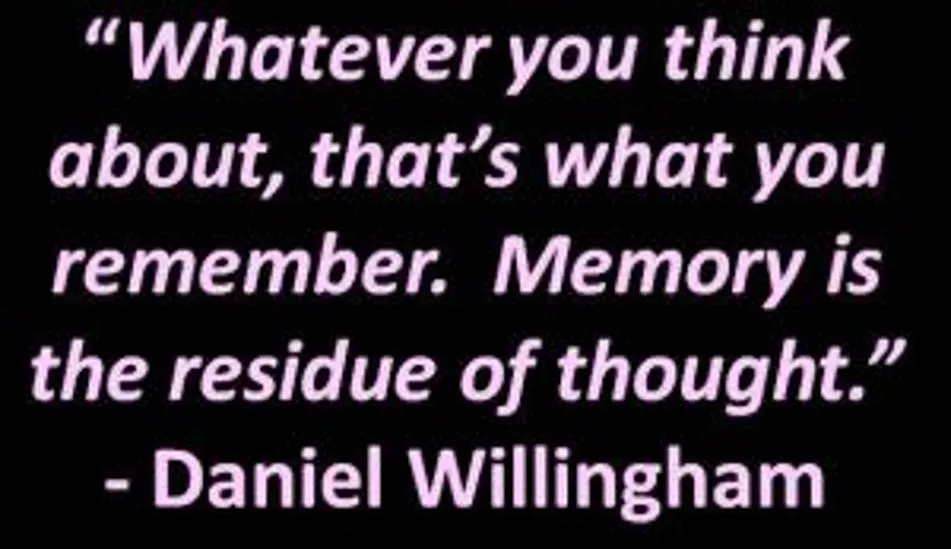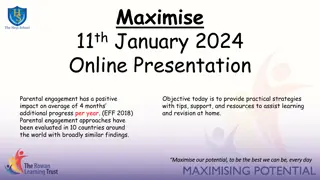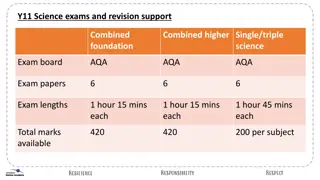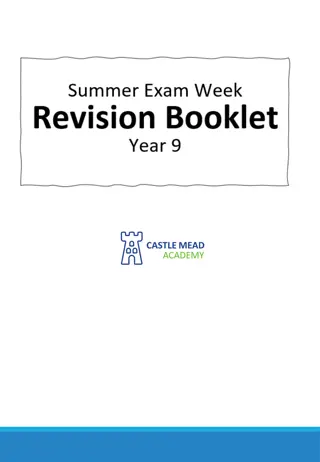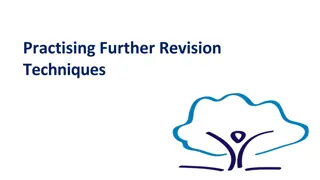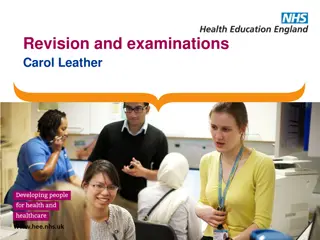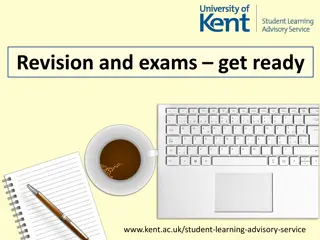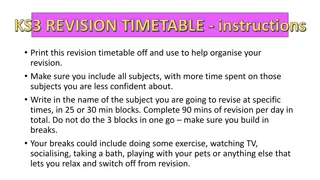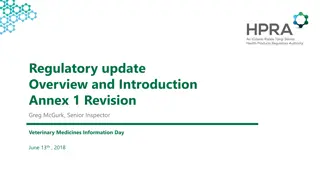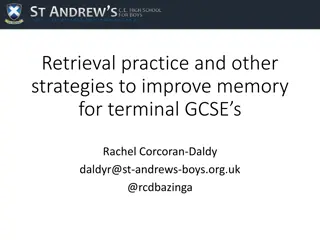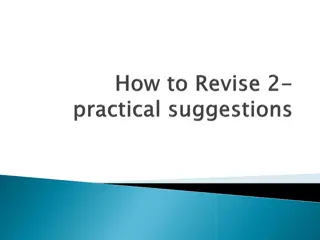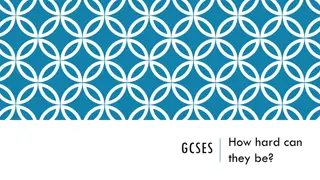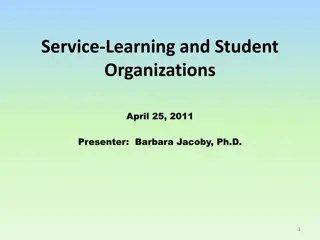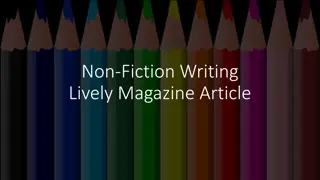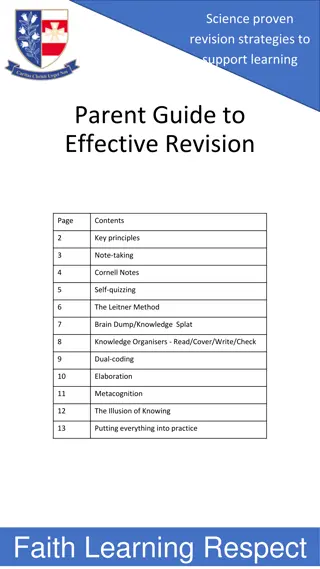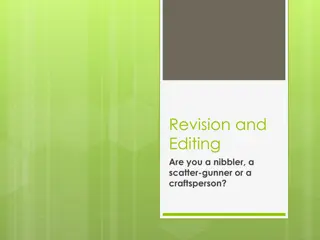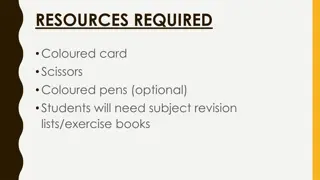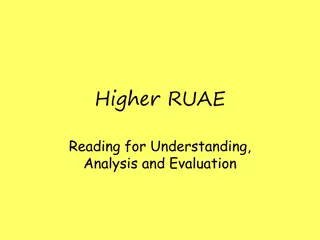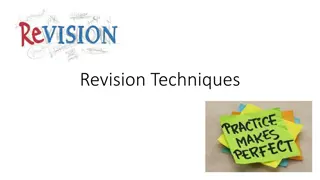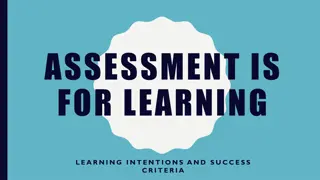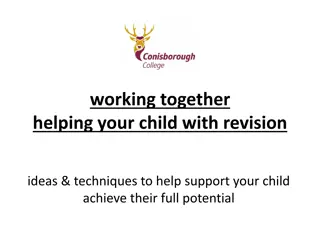Effective Revision Techniques for Student Learning
Explore strategies to enhance student learning through effective revision techniques, such as practice testing, distributed practice, elaborative interrogation, self-explanation, and interleaved practice. Encourage students to engage in activities like creating flashcards, working through past exam papers, and conducting quizzes to strengthen their understanding and retention of key information.
Download Presentation

Please find below an Image/Link to download the presentation.
The content on the website is provided AS IS for your information and personal use only. It may not be sold, licensed, or shared on other websites without obtaining consent from the author. Download presentation by click this link. If you encounter any issues during the download, it is possible that the publisher has removed the file from their server.
E N D
Presentation Transcript
Growth mindset & Questioning
This years objectives To develop deep and probing questioning for teaching/memory that elicits students to think hard, supporting a culture of growth mindset and questioning for assessment that informs teaching. To embed a culture of growth mindset across our learning community in order to raise aspirations and expectations of what students can achieve.
Hub 5: Objectives Hinge questions. - Individual feedback on using HQ Group critique of examples Questioning to help with revision Pre testing What s been our impact? Collate examples of changes to our teaching practice
Hinge Questions Review (Critique Examples) How were they used? Beginning (range-finding) Middle (mid-course correction) End (e.g., exit pass ) How did it affect the progress of the lesson/series of lessons? Any tips for creating hinge questions?
Its that time of year!! Questioning & Revision Strategies Dunlosky et al found to be ineffective. Highlighting texts Re-reading Summarising text
Why are these strategies ineffective? They each require very little cognitive work and it is cognitive work that makes us remember things. Popular with students though. Gratifying? - yes. Effective? - No.
5 Most effective techniques Practice Testing Distributed practice Elaborative interrogation Self Explanation Interleaved practice Taken from Shaun Allison s summary https://classteaching.wordpress.com/2015/01/29/supporting-learning-through-effective-revision-techniques/
Practice Testing Students keep testing themselves (or each other) on what they have got to learn. Highest impact in terms of supporting student learning. Some ways in which students can do this easily: Create flashcards: Q on one side, answers on the other - and KEEP TESTING. Work through past exam papers . Students can simply quiz each other (or themselves) on key bits of information. Create fill the gap exercises for their peers to complete. Create multiple choice quizzes for their peers to complete. Taken from Shaun Allison s summary https://classteaching.wordpress.com/2015/01/29/supporting-learning-through-effective-revision-techniques/
Elaborative Interrogation One of the best things that students can do to support their revision is to ask why an idea or concept is true (& then answer that question). For example; In science, increasing the temperature can increase the rate of a chemical reaction .why? In geography, the leisure industry in British seaside towns like Barry Island in South Wales has deteriorated in the last 4 decades .why? In history, in 1929 the American stock exchange collapsed. This supported Hitler s rise to power .why? So, rather than just trying to learn facts by heart asking why they are true will help students understand them and therefore remember them. Taken from Shaun Allison s summary https://classteaching.wordpress.com/2015/01/29/supporting-learning-through-effective-revision-techniques/
Using Q level analysis to plan revision
Individual class teaching timetable.
Pre Testing There has been a lot of research that has shown that pre testing students (in particular using MCQ) improves student outcomes. Little & Bjork examined the effects of taking a multiple-choice (MC) pretest on the later recall of both pretested and non-pretested related information. improved recall of pretested information . They concluded that : Even when an MC pretest takes time away from study, that pretest appears to make subsequent study more effective than other types of activities that pre-expose students to to-be-tested information .
Why does it help? Hamaker 1986 commented that Pretesting may be beneficial because it encourages more active involvement in learning, perhaps by increasing general interest in the topic. Additionally, the pretest may help students to discern what information is most important or what type of information the teacher is likely to test later. Thus, a pretest may lead to better recall for the previously tested information because it directs attention to the need to encode that information when encountered again during subsequent study (Hamaker, 1986).
FinallyWhats been our impact? Do we have examples of: - Deep and probing questioning for teaching/memory that elicits students to think hard, supporting a culture of growth mindset
Whats been our impact? Do we have examples of: - Questioning for assessment that informs teaching.
Whats been our impact? Do we have examples of: - Embedding a culture of growth mindset across our learning community in order to raise aspirations and expectations of what students can achieve.
In time for Hub 6 (WC 1stJune) Prior to next hub (Thursday 1stJune): - Teachers to complete follow up student voice with the same classes by Thursday 21stMay. - Submit final evidence pieces which illustrate how our Q hub has impacted our teaching: Possible Examples -Student work (e.g. written responses to challenging / deep / probing questions) -MCQ quizzes / assessments (with notes about how they were used and the impact). - Data analysis using the Basic Impact Excel Calculator (for example those of us who've have been trialling MCQ quizzes with a control and experimental group) - Examples of hinge or deep/probing Qs within your SoW (along with notes about how they were used and what impact they've had in lessons and/or examples of student work showing their use). - Student responses to hinge questions (e.g. exit slips along with notes about how you adapted your plan based on the responses) -Quick key app print outs with notes, with notes about their impact. -IRIS downloads (for example to illustrate the use of no hands up / challenge)
